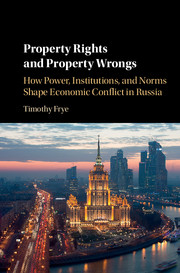 Property Rights and Property Wrongs
Property Rights and Property Wrongs Book contents
- Frontmatter
- Contents
- List of figures
- List of tables
- Acknowledgments
- Note on the text
- 1 Introduction
- 2 Power and Property
- 3 Autocratic Elections and Property Rights
- 4 Courts and Connections
- 5 Reputation and the Rule of Law
- 6 Social Norms and the Banker's Gold Watch
- 7 Conclusion
- Data Appendix
- References
- Index
5 - Reputation and the Rule of Law
Published online by Cambridge University Press: 31 March 2017
- Frontmatter
- Contents
- List of figures
- List of tables
- Acknowledgments
- Note on the text
- 1 Introduction
- 2 Power and Property
- 3 Autocratic Elections and Property Rights
- 4 Courts and Connections
- 5 Reputation and the Rule of Law
- 6 Social Norms and the Banker's Gold Watch
- 7 Conclusion
- Data Appendix
- References
- Index
Summary
Who steals my purse steals trash; ‘tis something, nothing;
‘Twas mine, ‘tis his, and has been slave to thousands;
But he that filches from me my good name
Robs me of that which not enriches him
And makes me poor indeed.
William Shakespeare, Othello, Act Three (3.3.180–186)I don't give a damn ‘bout my reputation.
Joan Jett, “Bad Reputation”Of course, courts are not the only institution that businesspeople in Russia use to protect property rights. As in all countries, businesspeople rely on a rich array of informal institutions that do not require enforcement by the state to guard their property. Concerns for reputation, ethnicity, cross-cutting social ties, and civic associations can promote stronger property rights without right-holders having to rely on state-backed coercion for enforcement. Scholars of postcommunism have forcefully argued for the importance of informal institutions in protecting property and promoting trade in the region (Gerber and Kharkhodin 1994; Frye 2000; Gaddy and Ickes 2002; Pyle 2005; Ledeneva 2006). Yet, there is still much to learn. What role do informal institutions, such as reputation, and formal institutions, such as courts, play in protecting property? How valuable is a good reputation relative to other forms of protecting property rights? Is word of mouth or press coverage a more potent source for reputation? Does a concern for reputation or confidence in the courts provide stronger incentives to trade? Do informal institutions that promote trade undermine or underpin state institutions?
Answers to these questions have important implications for transition and developing countries where many have cited weak institutions – both formal and informal – as a primary obstacle to economic development and political stability. Some argue that informal institutions, such as trust, social networks, and reputations are essential to protecting property (Macauley 1963; DeSoto 1989; Putnam 1993). Even the most capable state lacks the resources to resolve every dispute over property rights, and most states in the developing and transitional world are quite incapable. Informal institutions fill in the gaps where the state does not provide protection, allowing right-holders to protect their property. Others, however, suggest that formal institutions are central to protecting property rights (North 1981; Rauch and Evans 2000). State-backed adjudication and enforcement provides economies of scope and scale that informal institutions simply cannot match.
- Type
- Chapter
- Information
- Property Rights and Property WrongsHow Power, Institutions, and Norms Shape Economic Conflict in Russia, pp. 138 - 162Publisher: Cambridge University PressPrint publication year: 2017
- 1
- Cited by


